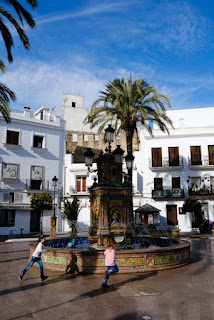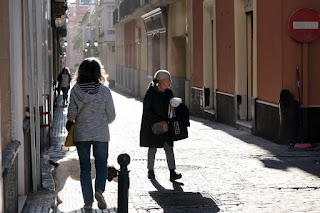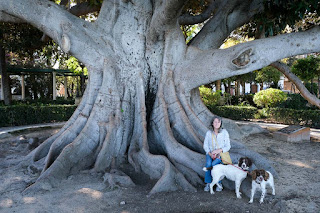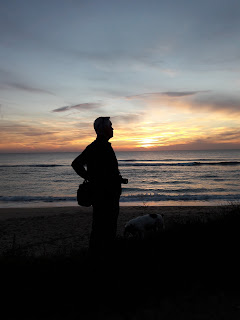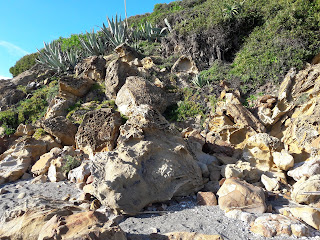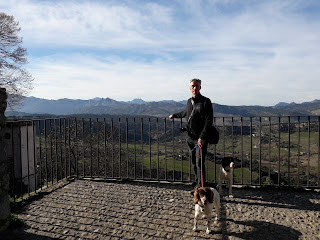Having left Pinar San Jose on Thursday, another of Spain’s blue sky and sunshine days, we headed for the white hilltop town of Vejer. It was a real treat as we followed one of the suggested walks in and around the old town walls. It is so picturesque that we could have spent a week just blending in and appreciating it. The environment wasn’t practicable for a motorhome stay, however, so after a lazy wander and a tapas lunch we left and made our way west to another seaside town called Rota. Through our book of “All the Aires - Spain and Portugal” Gareth had found a large motorhome aire next to the beach and we got there to find it well populated. We squeezed in beside another old-but-in-good-nick van and settled ourselves. It’s where we are now, at time of writing.
Around us is an encampment of Brits, Germans, Netherlanders, French and a few Spanish. Many of the vans are huge and top of their range, accessorised with trailers, motorbikes or other additional vehicles, barbecues, free-standing satellite dishes, solar panels and all sorts of other paraphernalia. None of these are following the etiquette of aire usage as we understand it. Aires are for stays of up to 48 hours at the most and camping behaviour (i.e., setting up your outside lounge and kitchen and hanging out your washing) is not permitted, we thought.
I’m finding it hard to see much difference between such ‘travellers’ and the ‘gypsy’ community who have a really bad reputation. The couple in the van next to us, both in their seventies, nice people, free-camp here for two months every winter. They’re a bit miffed that when they arrived this season their favourite parking spot had been taken. Another van is here permanently and not lived in at all. The owner apparently comes along occasionally just to start it up and check it over. Seeing that most vans are up on their chocks we did the same, even though it’s also not aire etiquette as we’d been led to believe. When I commented on all of this to our elderly neighbour he told me that the president had been around once (I don’t know what president.......Trump? Lol)) and told everyone that they couldn’t encamp as they are doing. But, everyone ignored him!
One couple have settled next to a grassy verge that has become their garden! They’ve even decorated the little shrub that resides on it with Christmas baubles and tinsel! Maybe I should have mentioned to him that one of the gossamer baubles on the top was definitely wobbling, like something about to burst. Has he heard of those killer caterpillars, I wonder. I’ve not yet seen any processional insects patrolling the area, but one of the garlands on that makeshift Christmas tree was decidedly brown and hairy. Everywhere there are cats, too - feral ones, and clearly someone is feeding them by leaving opened tins of cat food and bowls of drinking water in the shrubbery. Sheesh, even the cats are free-loading. (By the way, Pwdin has been transfixed, watching a kitten that climbs into the chassis of parked vans and mews pitifully......and I have no intention of taking it in, honest!).
None of these characters are ‘gypsies’ in the true meaning of the word. They are all snow-birds - Northern Europeans whose retirement has awoken the migratory instinct to fly south in the winter, drink wine and get skin cancer. I can quite understand the resentment expressed on-line by some Spanish motorhomers. They complain about these encampments leaving little room for the Spanish weekenders, and sadly they seem to think it’s the British mostly doing it. What a slur!
Why do people with obviously sufficient wealth to have equipped themselves with luxurious rigs and all the add-ons, set themselves up like this? Maybe it appeals to some vestigial rebelliousness and a hangover from the 60’s “f**k-the-establishment-and-live- free” culture. These old wannabe hippies never forgot the freedom-dream as they settled for conventionality, and nurtured it until they’d accrued a big enough pension to walk away from the shackles of working life and family raising. Living the dream now is to take up as much free space as possible in car parks where they don’t have to walk or cycle far for anything, the sun shines and there are enough kindred spirits around to provide safety in numbers and discuss the demerits of the host country.
Ok, so we’ve been free camping too, some of the time, and are doing so on this occasion, so who am I to judge. We don’t drape our bedding in the bushes though or blind our neighbours with big, shiny portable solar panels and smoke fish in empty parking spaces. We don’t wash our hair under the water tap (yes, it happened!) or snore on our sun beds on the verges (we don’t have a sun bed anyway). We got into motorhoming for the adventure of seeing places. What would be the point of our attempt not to shrink into a small life at home only to shrink into another, albeit sunnier, one.
This aire in Rota is definitely an attractive place to hole up in for a short while, though, if you don’t mind being surrounded by the strange outside-living habits of your fellow motorhomers. Here there are thoughtfully provided cycle tracks into and around the beach front and town (shame we didn’t bring our bikes). The beach is lovely, and just across the way. Apparently there are two laundrettes in the area (so WHY, oh why the laundry festooned hedgerow?), some inexpensive eateries and a good selection of supermarkets (why shop local when you can keep the BigCorps happy, eh?). There’s also an American air-base here that provides a lot of opportunity for plane-spotting, if you like that sort of thing. There are no aire charges at all and there’s a basic service of water, plus grey and w/c disposal points (handy for hair washing 🤔😱). But I’m the sort who feels uneasy about taking advantage and I certainly won’t do what so many have done by taking up more than one marked space and creating territory.
It seems to me that there are at least two sorts of motorhoming snow bird. There is the sort I describe above - hard to distinguish from the notorious ‘gypsy’ community other than their age profile, handbags and the nationality of their vehicle. And then there are those like the Pinar San Jose winter residents who, instead of brazenly taking advantage of free space, congregate every season in a proper paid for camp-site for their feelings of safety, comfort, conviviality and convenience (except for killer caterpillars and bitey mosquitoes, that is). The group we spent Christmas with have all mostly at some point done the Europe-wide travel thing and, like the free-campers described above, finally settled on a place they like and where they have gravitated towards each other in friendship and support. They even have their own Facebook group.
And they have stories that make us think. One lady, for whom I felt an instant fondness when we met, has for years spent most of the year at the site, living in a big fifth wheel rig with her husband, two dogs and a cat she adopted when it wandered in as a kitten. They had sold up at home to invest in their rig and a life of sunshine. Unfortunately, her husband passed away a couple of years ago and she is trying to sell the now-old rig, preparing for the inevitable of going back to Blighty to face her later years. Contrary to our assumption that the people we were meeting are, unlike us, all living on fat pensions, this lady doesn’t seem to be one of them. She told me how ‘home’ in the UK is a tow-caravan and I felt sad as this lovely lady, so welcoming of us, and clearly a fun person, told us about how she contemplates her future; how she will live on a meagre income and avoid having to depend upon her children. The others, too, are making the best of whatever resources they’ve managed to accrue in order to have their still-fit, reasonably healthy retirement years, “living the dream”. Some have made this lifestyle choice as a result of redundancy (aka ‘early retirement’), and I can relate to that.
We really like the Pinar People and have resolved to stay in touch, but in the chats over Christmas lunch and the camp chair gatherings beneath the pines, there is the unspoken knowledge that the dream has to end sometime, particularly with Brexit looming. The dream came to an end suddenly for one couple we met, Peter and Christine. This is their first time out; new to the lifestyle, like us. Gareth and Peter had so much to chat about as regards travel itineraries and the practicalities of our respective rigs. We had so much in common, we newbie travellers. Just after we left we heard via the group’s Facebook page that this lovely couple had their beautiful, new 2018 Burstner stolen from the woodland car park where they’d left it to go for a walk. They are now motorhome-less and are left, we imagine, with a very sullied impression of their trip of a lifetime.
We don’t know where we’ll head for next, and we will leave Rota tomorrow. Peter and Christine’s experience has made us suddenly more wary and I’m understanding motorhoming huddles better. It’s no different, really, from those wagon trains we used to see in the old Cowboys and Indians films, getting into a circle for protection. Now that Andalucia has voted in a far-right government with an anti-immigration policy, there might soon be a different treatment of invading snow-birds and the huddles will get even tighter!
PS Jess asks me whether it’s cheap, living like this. Yes it is if you don’t eat out, you free-camp staying put as long as possible and you shop at the cheap supermarkets like Lidl and Aldi, none of which contributes much to local economies, whatever they say about the value of tourism to countries like Spain. Oops, we’re as guilty as other snow birds, then (“Let he or her who is without sin....”) Unfortunately the exchange rate is rubbish at the moment, as well.
It can be reasonably cheap to pitch up for a month at a time on campsites out of season. I discovered how cheaply when I paid for our stay in Pinar San Jose. Having just parted with €114 for six days, I heard a new arrival ask about prices and was told that an 8 night stay would be €12 per night (I’d paid €19 per night! If only I’d known to ask about offers in the first place!) A month stay there would be €310, you’re happy to risk being poisoned by a hairy caterpillar, though, and bitten by the flippin mosquitoes.





